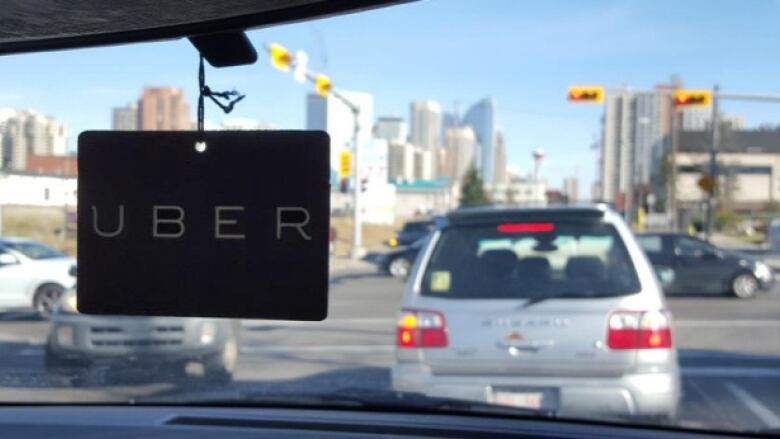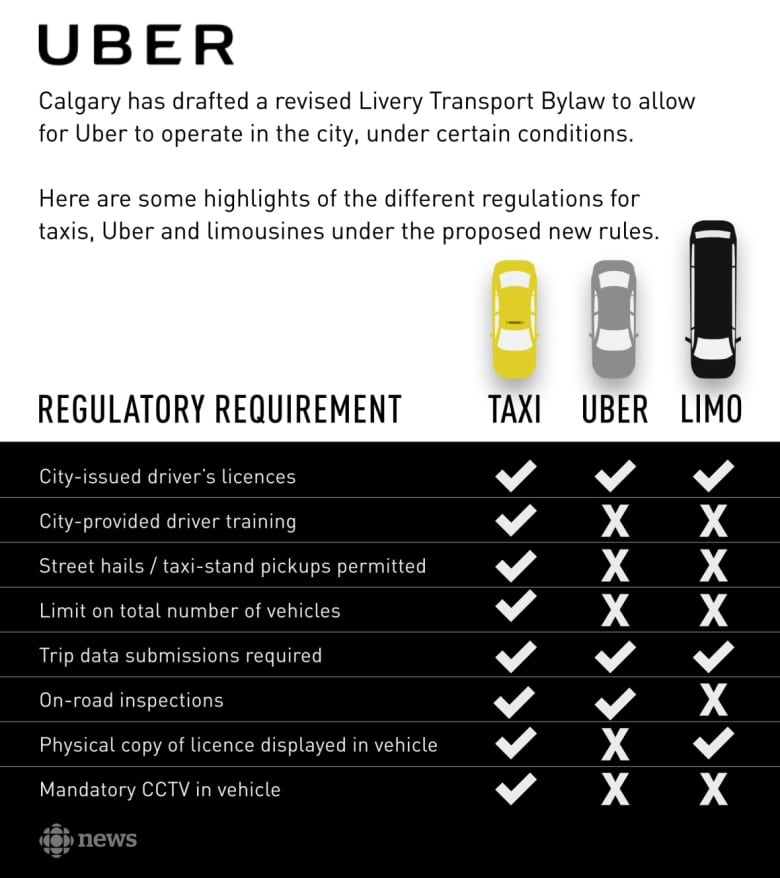Uber says it 'just can't operate' in Calgary under new bylaw before council Monday
Company already calling on city to go back to the drawing board

After blockingUberwith a court injunction last year,Calgary has drafted abylaw that it says would allow the ride-hailingserviceto resume operations in the citybut the companyis already rejecting the new rules as a non-starter.
"If this is the rideshare bylaw that goes through, we will not be able to operate," saidRamit Kar, Uber's general manager for Alberta.
City council is set to vote Mondayon the revised bylaw, butKar is callingon councillorsto send itback to city staff for further revisions.
- MORE CALGARY NEWS |Police officer's son a suspect in Woodbine fatal hit and run
- MORE CALGARY NEWS |Albertans spent $358M less in December than a year earlier
The new bylaw hasbeen months in the making, ever since a judge granted the city's request for an injunctionagainst Uber last Novemberafter the company unilaterally launched its lowest-cost ride-hailing service, UberX,in Calgary in October.
When it launched, Uber assertedthat the city's existing bylaws governing taxis and limousines don't apply to it or its "driver partners," but the city disagreed and successfully filed for the injunction.
Operating exclusively through a mobile app, Uber allows customers to connect directlywithdrivers, who operate as independent contractors rather than employees, in order to request a ride.
Payment is all handled within the app itself, based on trip distance measured via GPS-enabledmobile devices, and no cash is exchanged.
Uber has exploded in popularity around the world, and the company's estimated value has soared above $50 billion.But it has often encountered resistance from municipal lawmakers as they grapple with the challenge of reconciling decades-old taxi bylaws with modern communication and transportation demands.
Edmonton approves Uber
In January, despite vocal opposition from the taxi industry,Edmonton approved a new bylaw specificallyallowing for Uberto operatemaking it the first Canadian municipality to do so.
Uber welcomed Edmonton's rules but saysCalgary's draft bylaw, which is largelysimilar but contains numerous key differences, won't work for it or its drivers.
"The City of Calgary is proposing requirements intended to achieve the same objective, but in a manner that is much more onerous, expensive and does not reflect the benefits and inherent safety features of ridesharing," Ubersaid in a statement.
What is Calgary proposing?
The city's draft bylaw would revamp existingrules governing taxis and limousines and create a newclass of service that would include Uber and other potential market entrants like it.
Drivers of taxis, limos and Uber vehicles would all be required to havecity-issued licences,but only taxi drivers would be required to take city-provided training.
Unlike taxis, there would be no limit on the the number of Uber vehicles allowed to operate in the city
But Uber drivers would only be able to accept rides via its mobile app, leaving street hails and taxi-stand pickups and phone-dispatch requests as the exclusive domain of taxi drivers.

All three driver types would also be required to provide annual background checks from the Calgary Police Service, vulnerable-sector checks (a report which includes pardons for sexual offences) anddemerit-limit checks in order to obtain a city-issuedlicence.
The city is proposing alicensing fee of $220 per driver, per year, which it describes as "reasonable to help with the operational cost of enforcement."
Uber vehicles would also be required to be undergo inspections every six months under the proposed bylaw, but Mayor Naheed Nenshi has indicated he will press for that particularrule to be amended.
@MicheleRomanow @CouncillorKeats @Uber_Calgary that one is dumb. And uber knows there's an amendment to remove on Monday.
—@nenshiUberalso saysthe enhancedbackground screening isunnecessary, given that it already requires background checks admittedly less stringent ones fromits driver partners before they are allowed to drive.
Kar said all the costsCalgary is proposingadd up to an "unworkable" regulatorysystem formanydrivers who wouldwork only on a part-time and infrequent basis.
More than 60 per cent ofUberdrivers in Edmonton drive less than 10 hours a week, he noted.
To accommodate such drivers,Kar suggestedCalgary adopt something akin toEdmonton's fee structure,which sees Uber pay a $50,000 annual lump sum and then six cents per trip to the city.
Data sharing demands
The per-trip fee in Edmonton involves Uber sharing some of its internal data with city staff, something Kar said the company is also willing to do with Calgary, on a limited basis.
Calgary's proposal would alsoaskUber to provide city staff with "access to a portion of their app" for the purpose of locating Ubervehicles "for on-road inspections."
Kar said that part requires some clarification.
"If you guys want to have access to the Uber platform so you can conduct enforcement activities, we're finewith that,"he said."If it's actually getting access to some source code in the application or owning some part of the application, there's something very wrong with that."
Calgary taxis and limousines already share trip-related data with city staff, which is used to guide policy decisions.
Allegations of bullying
Uberencouraged its legions of digitally savvysupporters to pressure city councillorsby tweeting their opposition to the proposed bylaw with the hashtag#yyc4uber, which wasamong the top-three trending terms in Calgary on Friday.
Edmonton's Uber framework seems more than reasonable. Not sure why #yyccc wants more than this. #YYC4UBER #yyc pic.twitter.com/zBvPLYxXgQ
—@cipprezIn a lengthy series of tweetsof his own,Nenshi described Uber as inflexible and their strategy as "bizarre."
"We've been willing to discuss amendments," the mayor tweeted."They keep trying to threaten they'll just leave."
Coun. Joe Maglioccasaid Uber has been acting "like a bully" and the attitude from the company comes across as:"Either you do what we tell you to do or you can go to hell and we'll do it anyway."
"I don't appreciate that, to be quite frank with you," he said.
"But, you know what? It is a $50-billion company, after all."
Kar said Uber is merely being direct in saying what will and won't work when it comes to the city's proposed bylaw.
"The reality is that, for us, we just can't operate in that framework," he said."This isn't us trying to be a bully, by any means. We're just stating facts."
Insurance issues persist
Both Edmonton's approved bylaw and Calgary's proposed bylaw hinge onUberdrivers being properly insured, something that remains a challenge in Alberta as the type of insurance required isn'treadily available.
The province's superintendent of insurance issued a specialadvisory last summer about "ride sharing services and the insurance risk they currently pose to Albertans."
"Drivers usingUberride sharing services may believe thatUber'ssupplemental insurance provides the necessary coverage," the advisory stated. "This is currently not the case in Alberta."
The provincial government also said at the time it was working to update the regulatory regime in Alberta so that services likeUbercan be better insured, but a spokesperson said Friday there's still no timeline for when that will happen.
"Issues that need to be addressed include insurance and driver licensing to ensure the public is protected," Aileen Machell, press secretary toTransportation Minister Brian Mason, told CBC News in an email.
The government is still "looking at options," she added.
With files from Falice Chin












_(720p).jpg)


 OFFICIAL HD MUSIC VIDEO.jpg)
.jpg)



























































































